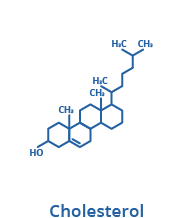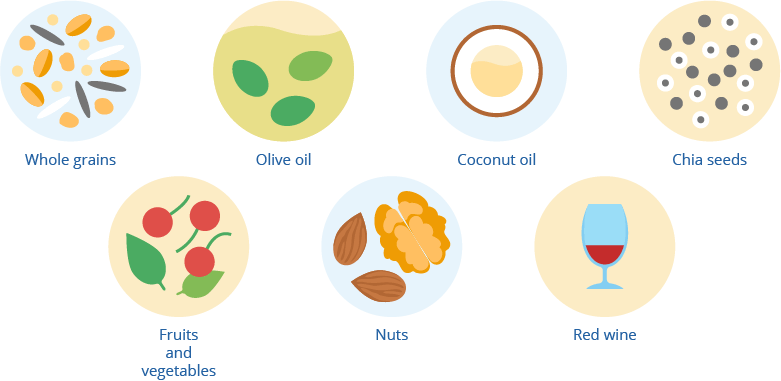Table of Contents
Ever wondered if your plate of greens could be your secret weapon against heart disease? Here's how a vegan diet could be your heart's best ally.
According to the CDC, heart disease is the leading cause of death in Americans, and someone dies from a heart attack every 40 seconds. Given these alarming stats, isn't it time we gave a second thought to our lifestyle and dietary choices? A robust heart doesn't just happen—it's nurtured.
One of the most important factors contributing to your cardiovascular health is your cholesterol levels, which can be highly affected by your dietary pattern. And as it turns out, one of the best ways to improve your cholesterol levels is following a vegan diet!
Gone are the days when veganism was a niche lifestyle choice. With its array of health benefits, especially for the heart, it's no wonder veganism is trending. So, what's the link between plant-based meals and those all-important cholesterol levels? Let’s unravel this connection.
Plant-based foods are rich in nutrients and devoid of cholesterol. Foods like oats, legumes, and nuts have been shown to actively lower bad cholesterol, making a vegan diet not just a trend but a heart-healthy choice.
Cholesterol Explained
 Did you know that your food could be the key to balancing the good and bad cholesterol in your body? Before diving into the heart-healthy benefits of veganism, let's demystify cholesterol and its relationship to your heart.
Did you know that your food could be the key to balancing the good and bad cholesterol in your body? Before diving into the heart-healthy benefits of veganism, let's demystify cholesterol and its relationship to your heart.
Cholesterol, a type of fat in our blood, is vital for creating hormones, absorbing vitamins, and more. For example, it’s an essential building block for important hormones like progesterone and estrogen, which manage your reproductive system. In addition, cholesterol helps your body digest fat-soluble vitamins like vitamins A and D.
Unfortunately, too much cholesterol can cause problems. Your liver generally makes all of the cholesterol that your body needs. Dietary habits, mainly those high in saturated fats, can increase cholesterol intake, affecting our overall heart health.
Like other nutrients, cholesterol is delivered to cells throughout your body via your bloodstream. However, it can’t travel through your body independently, so it needs to be “packaged” into different lipoproteins. This means there are a couple of different kinds of cholesterol, and two of the most important ones to be aware of are LDL and HDL.
- Think of Low-density lipoprotein (LDL) as the 'villain' in our cholesterol story. Often dubbed the 'bad' cholesterol, it's like sticky tape that clings to our arteries, leading to blockages.
- Conversely, High-density lipoprotein (HDL) is our 'hero.' Known as the 'good' cholesterol, it's like a cleanup crew, sweeping away excess cholesterol and preventing those dreaded artery blockages.
If someone has “high cholesterol,” it often means they have too much LDL and too little HDL. So, to improve your cholesterol levels, you want to decrease your LDL levels while increasing your HDL.
Now that we've established the role of cholesterol, let's delve into how our dietary choices, especially embracing a vegan diet, can tip the balance in our favor.
Dangers of Elevated Cholesterol
 High cholesterol levels are often a good indicator that you are more at risk for serious cardiovascular conditions because they can cause atherosclerosis or hardening of your arteries.
High cholesterol levels are often a good indicator that you are more at risk for serious cardiovascular conditions because they can cause atherosclerosis or hardening of your arteries.
Think of your heart as a diligent delivery service, pumping essential nutrients like cholesterol and oxygen to every nook and cranny of your body through highways called arteries.
Ideally, you would have a high enough level of HDL, or the “good” cholesterol, to carry away that excess cholesterol to your liver, where it can be properly disposed of. But when your HDL levels are also too low, this process can’t happen. Over time, this persistent plaque growth can morph into a condition called atherosclerosis, silently compromising your heart's health.
Unfortunately, this condition can block arteries and make it much harder for your blood to reach different body parts. If left unchecked, it can lead to serious issues like:
- Heart attacks: When blood flow to a part of the heart is blocked.
- Strokes: Occurs when blood flow to the brain is interrupted.
- High blood pressure: Consistent high force against artery walls.
- Heart disease: A collection of conditions affecting heart function.
Primary Causes of High Cholesterol
There are two components involved in high cholesterol: genetics and lifestyle factors.
Understanding your family's health history is crucial, as some individuals have a genetic predisposition leading to naturally elevated cholesterol levels. You are also more at risk for developing high cholesterol levels as you age, and men are more susceptible to it than women.
However, your lifestyle choices can also heavily influence your cholesterol levels.

- Diet - Consuming processed foods or diets rich in trans fats and saturated fats (like fried foods or pastries) can elevate cholesterol levels.
- Exercise - Being active, like taking brisk walks or cycling, boosts "good" HDL. Inactivity can have the opposite effect.
- Smoking - It's a double whammy! Smoking not only raises "bad" LDL but diminishes the protective HDL.
Remember, your body has different kinds of cholesterol, and the ratio of good to bad cholesterol also matters. So cholesterol levels are measured in two different ways:
- Total cholesterol: The sum of all cholesterol types in your blood.
- Cholesterol ratio: A comparison of your HDL to total cholesterol, providing insights into cardiovascular risks.
Dietary Factors & Cholesterol
It was once a long-standing belief that eating foods with a lot of cholesterol could raise your blood cholesterol. However, it turns out that that’s not quite the case. Emerging research suggests the impact of dietary cholesterol on our blood cholesterol levels isn't as significant as previously believed.
However, other unhealthy dietary patterns certainly can cause cholesterol issues. You may be more at risk for developing high cholesterol if your diet includes too many:
- Saturated fats: Primarily found in animal products like red meats and full-fat dairy. Excessive intake can elevate LDL levels.
- Trans fats: These stealthy culprits can hike up LDL levels. Common in many processed foods, they're also linked to conditions like diabetes and breast cancer. Always check labels!
- Processed foods: Beyond being trans fat traps, these include fast foods, fried treats, and certain snacks. They often contain other health adversaries like refined sugars and flours.
The Cholesterol-Lowering Power of Plant-Based Foods
While there are certain foods you might steer clear of for heart health, there's a plethora of goodies that do wonders for your cholesterol! Here are some heart-healthy options to add to your diet to lower cholesterol levels:
- Whole grains: Whole grains have a solid reputation as a heart-healthy dietary option because they are full of fiber. Fiber can reduce how your body absorbs cholesterol, which can help lower LDL levels. *
- Olive oil: Unlike saturated fats and trans fats, polyunsaturated fats are considered “healthy” fats that can help lower cholesterol. Many of these healthy fats are plant-based, including olive oil. *
- Coconut oil: Coconut oil is saturated fat, so its role as a heart-friendly dietary fat is more debated. However, some studies have shown that coconut oil can reduce LDL and increase HDL - so just be sure to use moderation. *
- Chia seeds: Chia seeds are another rich source of dietary fiber. In addition, chia seeds are a good source of ALA, an omega-3 fatty acid associated with better heart health. *
- Fruits and vegetables: Eating a diet that emphasizes fresh, whole fruits and veggies is generally linked to better heart health! These plant-based staples contain various beneficial nutrients, including fiber, to reduce cholesterol.*
- Nuts: They're not just tasty snacks but also treasures of ALA, the heart-hugging omega-3.*
- Red wine: Cheers to the antioxidants in red wine that, in moderation, can help balance cholesterol levels.*
Spotting a pattern? Many cholesterol-fighting foods have plant origins. This begs the question: what magic does a vegan diet weave for our cholesterol?
Vegan Diet's Role in Cholesterol Management
Ever wondered why the buzz around plant-based diets keeps growing? The science has some compelling answers, especially when it comes to heart health. This is especially true when it comes to heart health and cholesterol levels:
- One meta-analysis of 8,385 studies concluded that people who followed plant-based diets showed lower total cholesterol, LDL, and HDL levels than those who regularly consumed animal products.
- Another comprehensive study found that a vegan diet goes even further in protecting your heart health. Not only did people who ate vegan diets have better cholesterol levels, but they also tended to be a healthier weight, had better blood sugar, and showed lower blood pressure! *
So, there’s no shortage of evidence that plant-based diets are superior for anyone who wants to protect their heart health. But why is this?
In essence, a vegan diet excludes all animal products. While our liver naturally produces the cholesterol we need, animal products can spike those levels. Plants? They're cholesterol-free.
But even more important is the differences in fat consumption in a plant-based diet versus an omnivorous diet. Remember, excessive saturated fats are one of the main culprits for raising your “bad” LDL cholesterol levels. Saturated fats are most commonly found in animal-based products like red meat and dairy products. So, by nature, people who follow vegan diets consume much less saturated fat than people who eat animal products, which is often reflected in better cholesterol levels.
On the flip side, someone who eats a vegan diet will tend to eat more cardioprotective plant-based foods like whole grains, fruits, vegetables, nuts, and plant oils.
In a world of dietary choices, a vegan diet emerges as a heart champion—reducing harmful cholesterol and championing foods that bolster our cardiovascular system. Ready to give your heart the care it deserves?
Strategies for a Heart-Healthy Vegan Lifestyle
Whether you’re genetically predisposed to high cholesterol levels or want to change to a heart-healthy lifestyle, you can benefit from switching to a vegan diet.
However, there are extra considerations to keep in mind if you’re looking to lower your cholesterol levels:
- Prioritize fresh, whole foods: Opt for unprocessed fruits, vegetables, and ingredients to maximize nutritional value.
- Prioritize Fiber Intake: Many plant-based items naturally contain substantial amounts of fiber. Diversify your diet to ensure you get soluble and insoluble fiber from various sources.
- Consider Supplements: If needed, complement your diet with vegan-friendly supplement options, like vegetarian krill oil alternatives, to ensure comprehensive nutrition.
In short, if you’re eating various fresh plant-based foods rather than meat products, you’ll do your part to reduce your cholesterol levels! You can also supplement your intake of certain nutrients with vegan-friendly supplement options like vegetarian krill oil alternatives.
Holistic Approaches to Cholesterol Control
- Opt for Whole Foods Over Processed Alternatives: A plant-based diet predominantly focuses on natural ingredients. Yet, it's crucial to be cautious of trans fats often found in processed foods. Prioritize whole foods, as they offer the best benefits for your cholesterol.
- Invest in a Vegan Omega-3 Supplement: One challenge of a vegan diet is ensuring you receive all essential nutrients. Many derive their omega-3 from sources like fish or cod liver oils. Algae oil supplements are an excellent alternative for vegans, as they provide both EPA and DHA – omega-3 fatty acids known to help reduce inflammation and boost triglyceride levels*. Always discuss with a healthcare professional before introducing new supplements to your routine.*
- Embrace Regular Physical Activity: While diet is pivotal, so is physical activity. Exercise boosts your HDL levels, controls blood pressure, and also aids in maintaining a healthy weight. Follow guidelines like the American Heart Association, which recommends at least 150 minutes of moderate-intensity aerobic activity weekly.
- Monitor Your Cholesterol Consistently: It's imperative to be proactive. High cholesterol and blood pressure often lurk silently, showing no overt symptoms. Regular monitoring becomes especially vital if there's a family history of these conditions.
Conclusion
Going vegan may initially seem overwhelming, but its heart-healthy benefits are worth it. With zero cholesterol from plants and far fewer saturated fats, eating vegan is kinder for your entire body.


